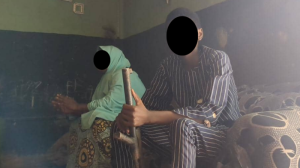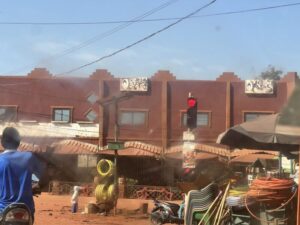Zage Zagi is a small agrarian community in Rogo Local Government Area (LGA), Kano State. The community is surrounded by a river known as River Tukurwa, it flows from neighbouring Makarfi, and Hunkwai communities in Kaduna state, and passes down to Zarewa, Zage Zagei, and Beli communities.
Rogo LGA has a vibrant farm sector and is host to several solid minerals including the popular silica sand.
Zage Zagei is about 5 kilometers away from Rogo town.
Stallion Times was informed that land degradation and a drop in farming activity began some 30 years ago when it was discovered that the community is endowed with black sand known as silica, or what the residents called “Bakin Kwalli.”
Silica sand is also known as Bakin Kwalli. PC: Stallion Times
Silica sand or Quartz, Tin, Columbite, lead zinc, Tantalite, Quartz, Gold, Uranium, Bauxite, Lithium, and Kaolin are abundant in Kano communities including Zage zagei.
The unregulated extraction of these mineral deposits is causing land degradation, and escalating the risk of coastal erosion, insecurity, and child labor.
At 1:00 pm on August 31, Stallion Times observed thousands of sack bags filled with silica sand on roadsides, trucks could be seen parked, and others were strolling in preparation for takeoff.
Trucks in Rogo town conveying silica sand. PC: Stallion Times
On the spot were drivers, silica loaders, and buyers transacting business and negotiating prices for mined silica sand in different shades of bags.
Once a deal is sealed, the sand is loaded, and trucks that take them to the factories in different parts of the country to produce glass; foundry, abrasive, and hydraulic fracturing applications, solar panels, grinding stones, engine plugs, and many other industrial uses.
Turning Farmlands to Mining Sites
While silica merchants are having their field day exploring the solid mineral in the community, the miners’ activities turn farmlands into mining sites, consequently causing the loss of farmlands, land degradation, increased number of school-age children dropping out of schools, and security threats.
Gambo Musa, 56, a farmer in the Zage Zagei community whose farmland has been dredged by silica miners, narrates his ordeal.
“I lost my farmlands 6 years ago. Indigenous miners dredged it.
“Before I lost my farmlands, I usually harvested more than 1000 bags of maize, 500 bags of rice, 2 to 3 trailers of tomatoes, and 1 truck of sugarcane.
Gambo Musa, a commercial farmer PC: Stallion Times
“The sales of the farm produce amounts to N50 million naira annually.
“Now I lost a large portion of my hectares of farmlands, and left with nothing.”
Maryam Usman, 34, is a widow female farmer known for commercial farming.
She has been catering to her 5 children in the past 5 years from the proceeds of her farm.
In 2021, she lost 4 acres of the farmland to miners.
Maryam narrates her story.
“On the morning of 10 April 2021, I went to my farm to apply fertilizers.
“At the farm, I saw about 1 acre had sunk into the river and there were 5 young men filtering water out of sand to extract Silica.
Maryam Usman, a female farmer PC: Stallion Times
“I broke down and fainted because I have rice, millet, guinea corn, sugarcane, and tomatoes on that farmland.
“One week later, an erosion destroyed the other portion, leaving me with nothing; it forced me to work for other people to cater to my children.”
Community members claimed that the unregulated mining has destroyed over 15,000 hectares of farmlands.
Sani Salisu, 52, is the head of farmers in Zage Zagei town.
According to him, in 12 years, he has lost 15 hectares of onions, maize, millet, sugarcane, wheat, tomatoes, chili pepper, and cowpea.
Sani Salisu. PC: Stallion Times
Despite realising at least N10 million Naira annually from his farmland, he claims that since 2011 he has lost over N100 million.
“I barely make N500,000 from my new farmland because of miners,” he lamented.
The Thriving Silica Business in Zege-zagei
Approaching the Tukurwa River tributaries, about 1 kilometer from the Zage Zagei community, this reporter saw underage children and adults busy in the river searching for silica sand.
The mining site is stocked with over 200 dunes made by miners at different locations; these serve as a means of extracting the silica.
Sand Dune PC: Stallion Times
Stallion Times observed that miners fetch the sand from the tributaries, spread it on a flat piece of leather, and filter it with water to extract silica.
After gathering enough silica, it is stocked in a sack for sale. Some miners move their consignment to Rogo town to sell to eager merchants.
One of the major buyers of the silica sand is Malcom Mining firm based in Jos, Plateau state. A brief search of the status of the firm on NGcheck.com and the website of the Corporate Affairs Commission revealed that the company is unregistered.
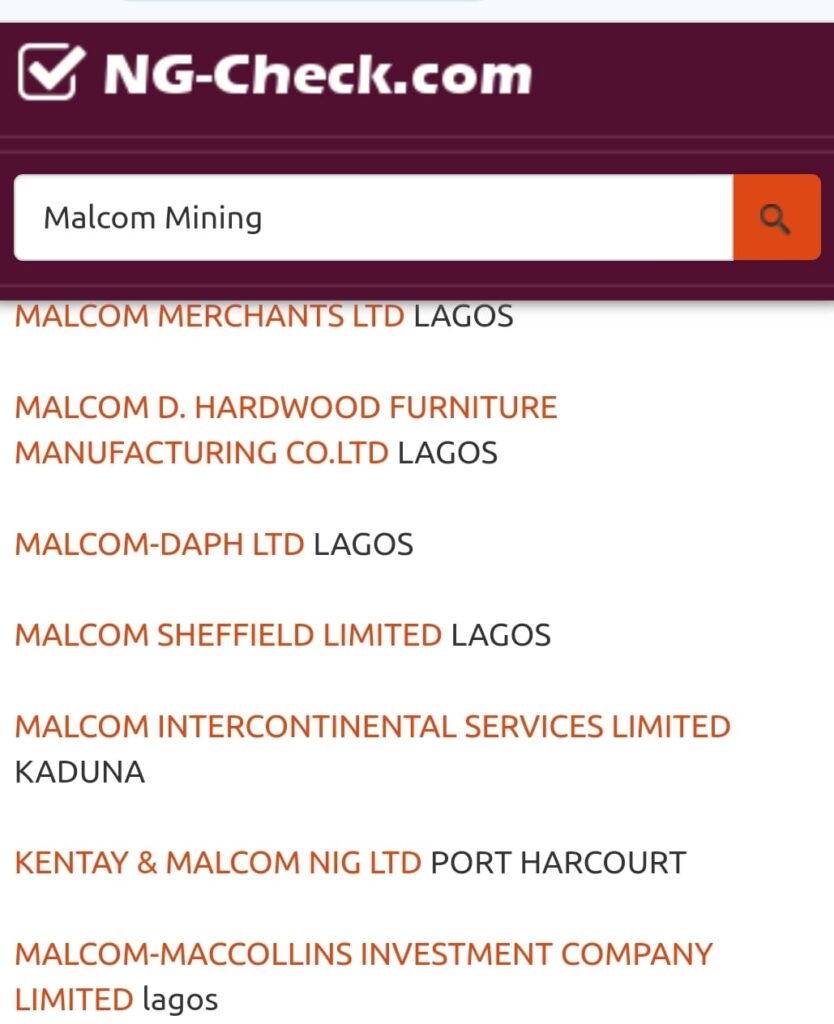
Again, Malcom Mining Firm is not on the list of companies registered by the Nigerian Mining Cadaster Office, Abuja to extract, mine, or transport solid minerals in the Kano.
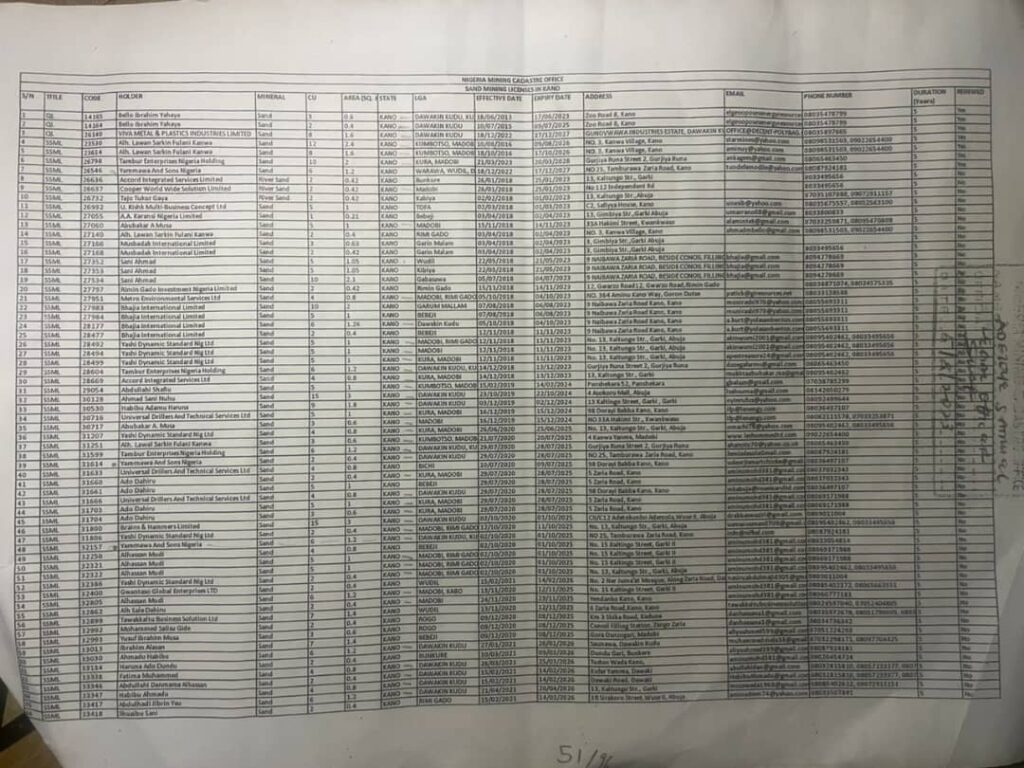
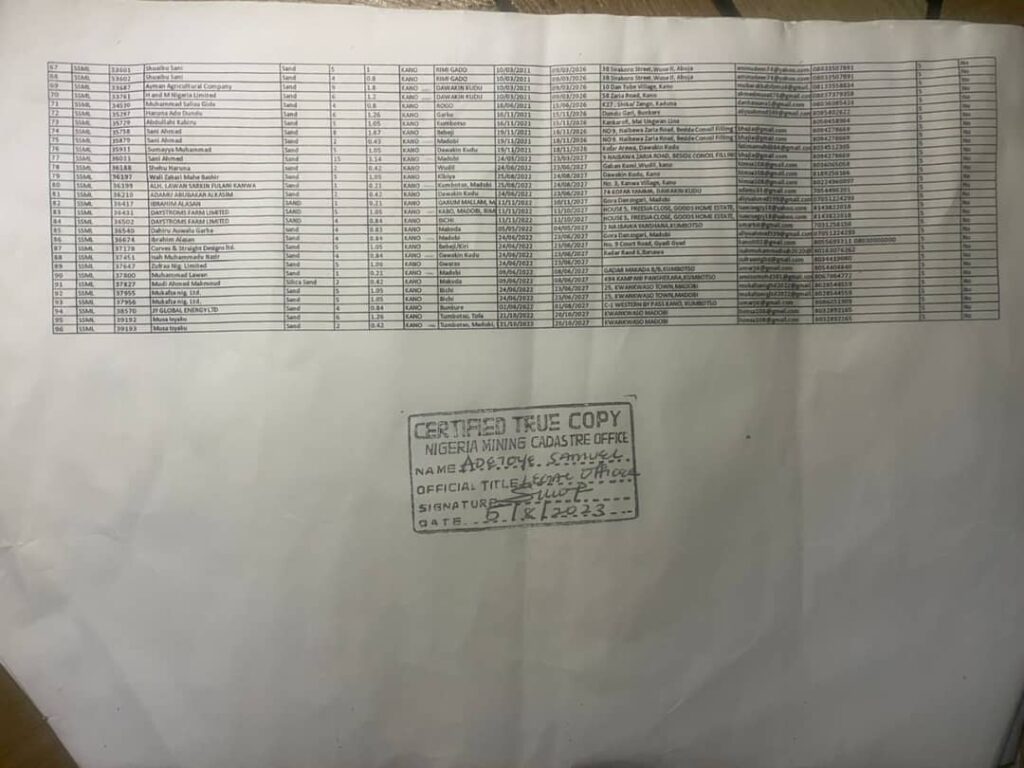
Document containing licensed miners in Kano obtained from the Nigerian Mining cadaster office, Abuja.
Stallion Times was informed that one Auwal Adam, 25, a native of Zage Zage and a graduate of the University of Jos approached Malcolm Mining, a company in Jos, and introduced the silica to the company.
Upon examination and confirmation of its quality, Adam was commissioned as a supplier.
He told these reporters that the company usually extracts monoxide and iron from the Silica and uses it to construct engine parts.
While responding to this reporter, Adam was making cash transactions with miners.
“In a week I usually send 3,000 to 4,000 bags of silica, equivalent to two or three trailers to Malcom Mining Company.
Auwal Adam making a payment to a local miner. PC: Stallion Times
“The lowest price per trailer is 2 million Naira, though this can occasionally change,” he declared.
He did not disclose his earnings from the company.
However, residents said Adam received a brand-new bike from Malcom Company in 2022.
Investigation revealed that Malcolm Mining Company is not the only buyer of silica sand, other companies like Seventeen Nigeria and Alhaji Ibrahim Mining are involved.
A farmer in Zage zagei, Yakubu Namama, 51, disclosed that one Umar Tashar Baduku, a resident of Tashar Yari in Makarfi LGA, Kaduna state is among the buyers of the silica sand.
He also disclosed that Baduku recruited minors to help him mine silica in large quantities for collection every week.
On 2nd September 2024, this reporter called Baduku on the telephone, after being confronted with questions, he claimed to be unavailable for questioning and promised to call back….he has not called. His telephone line has been switched off since then.
Each sack of silica bag is selling for N2,500 to N3,000 depending on the weight.
Investigation disclosed that a majority Silica miners are in Zage-zagie town while buyers are outside the state.
In Zage Zagei, silica deports are uncountable as some miners hoard the stock in their houses.
Due to the thriving business, underage children between the ages of 13 and 16 also participate in silica mining.
Umar Tukur, 12, and Ibrahim Bello, 11, are two of many minors that mine silica in the Zage Zagei community.
Both Tukur and Bello are primary two pupils of Zage Zagei Primary School.
They abandoned school to pursue sand mining because people are benefiting financially from it.
According to Bello, they want to benefit from the resources that our community is being blessed with.
These boys have abandoned school in search of silica around the river tributaries.
Umar Tukur and Ibrahim Bello weighing their Silica sand PC: Stallion Times
Standing beside a silica measuring scale, Tukur narrates that every day he comes with his friend to extract silica.
“We fetch the sand and filter it with the water to extract silica.
“Some days we make a full sack of cement, other days we hardly have a full sack.
“We sell a kilo of silica sand at 35 Naira and use the money for our daily upkeep.”
Experts noted that mining activity exerts a long-lasting impact on landscape, eco-system, and socio-cultural-economic concerns.
Research and Grant Manager at the Centre for Dryland Agriculture, Bayero University Kano, Dr. Hakeem Ajeigbe, highlighted the detrimental effects of unregulated mining on agriculture.
“The process of mining causes damage to the soil and agricultural lands, destroying the landscape and reducing the productivity of arable lands.
“When farmlands are destroyed by miners, it takes away their income and leaves many of them in poverty.
“This situation can exacerbate tensions between farmers and miners.
“Aside from the crops that are destroyed, grasses that would have been used to feed cows are also wiped out, making it difficult for herders to find fodder for their livestock.
“When arable lands are ruined by the activities of miners, cattle sometimes graze on farmers’ crops, which is wrong and often leads to conflict and, in some cases, security threats.”
Dr. Ajeigbe warns that unchecked sand mining results in unemployment, security threats, a reduction in the agricultural value of the land, and many other hazards.
He urged the government to strengthen governance at the local government and grassroots levels to address these illegal miners and ensure they face justice.
“Now that there is local government autonomy, they should use this opportunity to end unregulated mining to save lands and crops.”
Safety is our concern – Residents
Rogo, which borders Makarfi and Hunkwai of Kaduna State, also shares boundaries with Kafur and Malumfashi in Katsina State.
These states are known to be struggling with security challenges, like banditry and kidnapping.
Sani Shuaibu Rogo, a social justice, good governance, and sustainable community development campaigner, told Stallion Times that the primary silica sand merchants reside in the village.
Their stay here has significant consequences for socioeconomic, environmental, and security issues.
He alleged that the continuous development of these mining activities is with the consent and permission of the constituted authorities of Rogo Local Government Area.
“There is an early warning sign of conflict between youths of the community’s silica merchants disturbing their peaceful coexistence.
Sani Shuaibu Rogo
“As I speak to you now, there are plans to confront these miners and buyers.
“These youths have the support of their parents who have lost their farmlands to mining activities.
“So, the residents are now frustrated, this might lead to conflict between farmers and miners, or attract bandits from our bordering communities.”
According to Sani, between 2023 and 2024, it is estimated that there will be about 8 cases of security challenges around some mining communities such as Falgore, Kauyen Yan Musa, and Zarewa communities in Rogo LGA
On security, Dr. Yahuza Getso, a security expert, outlined the significant security challenges posed by unregulated mining activities in rural areas.
“The solid mineral mining challenges are multi-dimensional, rooted in social, economic, and institutional failures.
“One of the primary factors driving illegal mining is unemployment, many young people, in the absence of viable employment opportunities, turn to illegal mining as an alternative means of livelihood.
“Government institutions that are supposed to manage these mining sites often lack the necessary data and control mechanisms.
“This system failure gives room for criminal networks to emerge and thrive in these regions.
“There needs to be collaboration between security agencies and community leaders to develop a responsive system for managing the situation.
The security expert stressed that unregulated mining not only destroys the environment but also causes friction between the people and their leaders, as there is often a lack of understanding and communication.
Kano State Ministry of Solid Minerals and Natural Resources React
Hamza Safiyanu, the Kano State Commissioner of Solid Minerals and Natural Resources, expressed concern over the illegal mining activities in the state, highlighting the government’s efforts to tackle the issue.
He acknowledged the prevalence of illegal mining but assured that measures were being implemented to end these activities and establish policies to involve communities and protect the environment.
“We are aware of it, and we are taking all necessary steps to bring this issue to an end.
“We aim to develop policies that will enable both the communities and the environment to come together, so even the state government can generate revenue from these activities.
“It’s not what you would traditionally call mining, but rather the gathering of particles washed away by water.
“These activities may peak during certain months, but they will likely disappear soon after,” he assured.
Hamza Safiyanu, the Kano State Commissioner of Solid Minerals and Natural Resources
In the mix of these unregulated mining activities, on 11 September 2024, Earth Wish Nigeria Limited paid a courtesy visit to the Commissioner and declared plans to employ over 100,000 Kano indigenes after it launched an operation in the state.
Chairman of the company, Abba Sani Abdullahi, said the firm is in Kano to revive the mining industry which will drive revenue to the state.
Today, Kano does not have any legislation on exploration, mining, small-scale mining, possession or purchase, mineral buying centers, or exporting.
This report was supported by the Wole Soyinka Centre for Investigative Journalism (WSCIJ) through Stallion Times under the Collaborative Media Engagement for Development Inclusivity and Accountability Project (CMEDIA) funded by the MacArthur Foundation.


